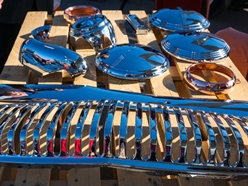Once the insurance company agrees to pay your property damage claim, you may feel like there is nothing else to be worry about. Unfortunately, that is not the case. Have you checked to see what type of parts the insurance company authorized the repair shop to use? If not, you might find that these parts are not at all what you expected. In fact, they may not even be new parts.
What Type of Parts Can I Demand When Another Driver Causes My Auto Crash?
 Hopefully, you realized that you have a right to pick the repair shop that does repairs and have done this. You want to ask the company what type of parts will be used in your car repair. Under Georgia law, the insurance company for the negligent driver is required to provide you with a vehicle in the same condition as before the crash. Since your vehicle was used, they can probably use some form of used parts, but they must be quality parts.
Hopefully, you realized that you have a right to pick the repair shop that does repairs and have done this. You want to ask the company what type of parts will be used in your car repair. Under Georgia law, the insurance company for the negligent driver is required to provide you with a vehicle in the same condition as before the crash. Since your vehicle was used, they can probably use some form of used parts, but they must be quality parts.
If you are making a claim under your collision coverage, your insurance policy language will state the type of parts your insurance company can use. Often, these policies allow them to use “Like Kind and Quality” parts, which are also known as LKQ. You should understand that different types of parts could be proposed—and you have a right to demand a safe option. These choices include the following:
- Original Equipment Manufacturer Parts (OEM): These are new parts produced by the manufacturer and are the safest, highest quality parts. You should try to insist that these parts be used in your vehicle, especially if your vehicle is a newer one.
- Economy parts. These are parts that are manufactured by companies other than the original manufacturer and can be made inferiorly. Some of the parts may be unsafe. While they may be of like quality, they are not on the same quality level as OEM parts.
- Aftermarket Crash Parts. Aftermarket crash parts are imitation sheet metal, plastic, or lamp parts that are of far inferior quality and can pose a safety hazard. These parts should not be accepted given their safety risks.
What Are Your Options If the Insurance Company Wants to Use Non-OEM Parts?
You should start out insisting on OEM parts or at a minimum used OEM parts. But what if the insurance adjuster will not budge on using economy parts? You could do one of the following:
- If the company refusing to pay for OEM parts is your own insurance company, you could pay the difference between the non-OEM and OEM parts so you can have the better-quality parts installed. Then you could pursue a claim against the negligent driver for the difference.
- If you must use the parts that the insurance company insists on, you should try to get a written warranty on these parts.
- You could hire an experienced car accident attorney who is experienced in handling the property damage portion of your claim and have him negotiate your settlement for you. You will be at a distinct disadvantage if you try to negotiate your settlement on your own.
What If There Is Hidden Damage?
Frequently, the repair shop will discover additional damage when repairing a vehicle damaged in a crash. What happens in this situation? Usually the mechanic will contact the insurance company repairing the vehicle to authorize the additional repairs. Sometimes the adjuster will send out an appraiser to inspect the damage before authorizing the additional work. Before you pick up your vehicle after repairs are completed, you will want to find out if any new damage was discovered and confirm that it was repaired.
If you need to file a property damage claim, you may be surprised at how complicated it can be and how the insurance company will delay paying your claim. The experienced legal team at Brauns Law Accident Injury Lawyers, PC has helped many clients with all types of insurance claims after a car accident. Start an online chat or call us to schedule your free consultation to get your questions answered and learn how we can help you.
Related Links:














